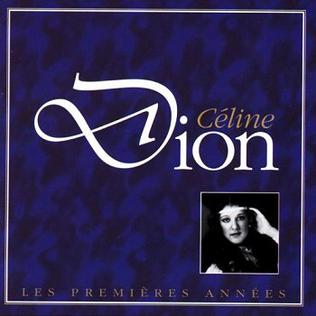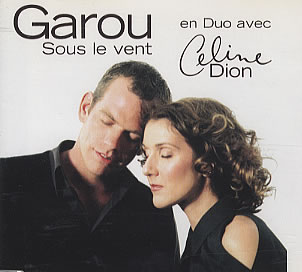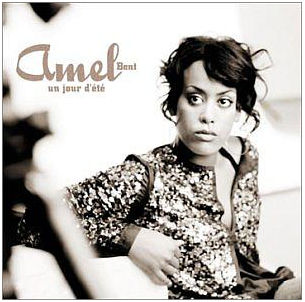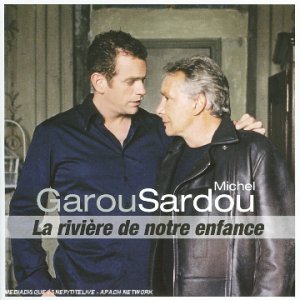
"On ne change pas" is a song by Canadian singer Celine Dion from her sixteenth studio album, S'il suffisait d'aimer (1998). It was written by Jean-Jacques Goldman and produced by Goldman and Erick Benzi. The song was released as the album's third single on 1 March 1999. "On ne change pas" topped the chart in Quebec for six weeks. Elsewhere, it peaked at numbers 11 in Poland, 16 in Belgium Wallonia and 17 in France.

Isabelle Boulay, is a Canadian singer.

Les premières années is a French-language compilation album by Canadian singer Celine Dion, released in France by Versailles on 10 January 1994. It features eighteen rare songs recorded between 1982 and 1988, including the Eurovision-winning "Ne partez pas sans moi". In France, Les premières années was certified Gold. The album was also released in Belgium, reaching number twelve on the chart in Wallonia.

"Sous le vent" is a song by Canadian singers Garou and Celine Dion from Garou's debut album, Seul (2000). It was written by Jacques Veneruso and produced by Erick Benzi, with additional production by Humberto Gatica and Aldo Nova. "Sous le vent" was released as the album's third single on 29 October 2001. The song became a hit in Francophone countries, topping the charts in France, Belgium's Wallonia, and Quebec, and reaching number two in Switzerland. It was also certified Diamond in France and Platinum in Belgium and Switzerland. In 2005, "Sous le vent" was included on Dion's greatest hits album, On ne change pas.

"En attendant ses pas" is a song by Canadian singer Celine Dion from her sixteenth studio album, S'il suffisait d'aimer (1998). It was written by Jean-Jacques Goldman and produced by Goldman and Erick Benzi. The song was released as a promotional single in May 1999. "En attendant ses pas" topped the chart in Quebec for four weeks and reached top 10 on the airplay charts in France and Belgium Wallonia.

"Zora sourit" is a song by Canadian singer Celine Dion from her sixteenth studio album, S'il suffisait d'aimer (1998). It was written by Jean-Jacques Goldman and J. Kapler, and produced by Goldman and Erick Benzi. The song was released as the album's lead single on 7 September 1998. "Zora sourit" topped the chart in Quebec for five weeks. Elsewhere, it peaked at numbers seven in Poland, 12 in Belgium Wallonia, 20 in France and 25 in Switzerland. It was also certified Gold in France and Belgium. The song's lyrics and music video denounce racism and advocate tolerance.

"Les derniers seront les premiers" is a song by Canadian singer Celine Dion from her thirteenth studio album, D'eux (1995). It was written by Jean-Jacques Goldman and produced by Goldman and Erick Benzi. The live version of the song from Live à Paris was released as a promotional single in October 1996. It entered the airplay charts in Francophone countries, reaching numbers three in Quebec, 19 in France and 47 in Belgium Wallonia.

De l'amour le mieux is the third studio album by Natasha St-Pier, released in 2002. It achieved great success in France, Belgium (Wallonia) and Switzerland.

Un jour d'été is a 2004 album recorded by French-born singer Amel Bent, released on 2005. It was her debut album and was successful on the charts, even allowed Bent to gain a Victoire de la Musique in the category 'Revelation of the year'. There were three singles from the albums, all of them being top ten hits in France : "Ma Philosophie", "Le Droit à l'erreur" and "Ne retiens pas tes larmes".

"Parle-moi" is a 2000 song recorded by the Canadian pop singer Isabelle Boulay. It was the first single from her fourth album Mieux qu'ici-bas, on which it features as the first track. Released in October 2000, this pop song/ballad achieved a great success in France and Belgium (Wallonia), reaching the highest positions on the charts.

Mieux qu'ici-bas is francophone Canadian pop singer Isabelle Boulay's third studio album, released in September 2000. It was led by the hit single "Parle-moi" which was released about the same time. The album achieved a great success in Belgium (Wallonia) and France, where it reached the top ten and stayed on the chart for about two years.

Tout un jour is francophone Canadian pop singer Isabelle Boulay's fourth studio album, released in May 2004. It contains a duet with Johnny Hallyday, "Tout au bout de nos peines," which was a top ten hit in France and Belgium. The album was in these countries very successful, making the top five and remaining on the French charts for almost two years.

Au moment d'être à vous is francophone Canadian pop singer Isabelle Boulay's second live album, released in September 2002. It achieved a great success in Belgium (Wallonia), France and Switzerland, where it reached the top ten. It also stayed for 57 weeks on the French Albums Chart and was certified Platinum by the SNEP.

Du temps pour toi is francophone Canadian pop singer Isabelle Boulay's third live album, released on October 14, 2005. It met a rather good success in Belgium (Wallonia) and France, where it reached the top twenty.

"Je voulais te dire que je t'attends" is a ballad song originally recorded in 1976 by the French singer Michel Jonasz. It was covered by The Manhattan Transfer in 1978 on the album Pastiche, and released as a double A-sided single with a cover of Where Did Our Love Go reaching No 40 in the UK singles chart. Also by Isabelle Boulay, Diane Dufresne Maurane and Patrick Bruel in 2001 for Les Enfoirés' album L'Odysée des Enfoirés, and by Hoda, Lucie and Sofiane, three contestants of the French version of Star Academy 4 whose cover is available on the 2004 album Les Meilleurs Moments.

"La Rivière de notre enfance" is the name of a 2004 song recorded in duet by Canadian singer Garou and French singer Michel Sardou. It was released in November 2004 as the third single from Garou's second studio album, Reviens, as well as the first single from Sardou's 2004 album, Du Plaisir. The song was a No. 1 hit in France and Belgium (Wallonia) and also achieved success in Switzerland. It was the fourth No. 1 hit in France for Garou, making him the artist with the most weeks spent in that position up to that point.

Reviens is the second studio album recorded by the Canadian singer Garou, and his third album overall. Released in May 2003, this album was a great success in many countries, including France, Belgium, Switzerland and Poland where it reached the top five.

À la vie, à la mort ! is a 2002 double album recorded by French singer Johnny Hallyday. It was released on 4 November 2002 and achieved huge success in France and Belgium (Wallonia), where it topped the charts, and in Switzerland. It provided four top ten singles in France: "Marie" (#1), "Ne reviens pas" (#8), "L'Instinct" (#9) and "Je n'ai jamais pleuré" (#4). Many famous artists, such as Gérald De Palmas, Catherine Lara, Maxime Le Forestier, Patrick Bruel, Hugues Aufray, Stephan Eicher, Axel Bauer and Marc Lavoine, participated in the composition of the album.

Ce que je sais is a 1998 album recorded by French singer Johnny Hallyday. It was released on 23 January 1998, and achieved success in France and Belgium (Wallonia), where, however, it failed to top the charts, being blocked by the soundtrack album of The Titanic. It provided four singles in France, but a sole top ten hit : "Ce que je sais" (#9), "Debout" (#58), "Allumer le feu" (#39) and "Seul" (#32). The album was entirely composed by French artist Pascal Obispo, helped on certain songs by Zazie and Lionel Florence.

États d'amour is francophone Canadian pop singer Isabelle Boulay's second studio album. It was released in Quebec in February 1998 and in France in November 1998, with a somewhat different sequence of tracks. Also, a limited edition was issued consisting of the French release together with a bonus mini-CD.



















